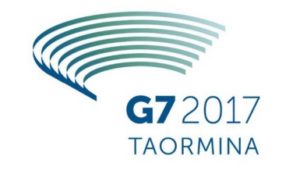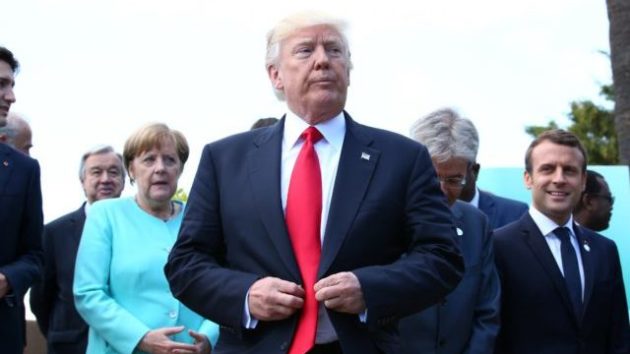The G-7’s Outrageous Hypocrisy by John Tamny
 An article in Saturday’s Wall Street Journal about the European leg of President Trump’s first foreign trip came with the headline: “Leaders Confront US on Russia, Climate.” In particular, non-US G-7 leaders are all strongly in favor of the 2015 Paris climate agreement that would require participating countries to limit carbon emissions, among other restraints on economic activity.
An article in Saturday’s Wall Street Journal about the European leg of President Trump’s first foreign trip came with the headline: “Leaders Confront US on Russia, Climate.” In particular, non-US G-7 leaders are all strongly in favor of the 2015 Paris climate agreement that would require participating countries to limit carbon emissions, among other restraints on economic activity.
Trump disagrees, thus the confrontation, owing to his correct belief that the climate deal would prove a barrier to economic growth.That Trump was in opposition to the other G-7 members apparently led to some tense discussion about the US’s desire to exit commitments made during the presidency of Barack Obama. German Chancellor Angela Merkel confirmed that opinions expressed about the withering climate accord “were exchanged very intensively.”
You Obey, We Ignore
Merkel and other G-7 leaders disappointed in the 45th president have no leg to stand on, and certainly aren’t in the position to confront any US president. Trump should make this plain without an ounce of regret. The latter would be true even if the Paris accord were a credible answer to the theory that says economic progress is a major threat to our existence.
Indeed, the Europeans talk a big game about the importance of commitments, and of how the alleged fight to save the earth “has to be a collective effort,” but they’ve shown no remorse about their own persistent failure to honor their NATO spending pledges.
Translated, these nations expect the United States to weaken its economy based on an unproven, but rather expensive theory about the effects of climate change. But when it comes to living up to a longstanding agreement among NATO members to share the costs of a mutual defense shield, they’ll let the US foot the bill.
More interesting here is that in their desperation to keep the US in the Paris fold, Merkel and others are implicitly saying that any agreement made among leading western European countries without the US isn’t worth the paper it’s printed on. With good reason.
So Much for Commitment
Consider non-NATO treaties like Maastricht, in which EU nations agreed to limit their deficit spending so that their debt/GDP ratios would always stay below 60%. Woops. As of 2015, Germany (74.4%), France (89.6%), and Italy (122.3%) were all well above what the G-7 countries committed to when they signed the treaty that led to the euro. As for their commitment to requiring euro member states to individually handle their debts, it too went out the window given the fear among EU members about what debt default would do to certain large banks.
Back to NATO, the European leaders so eager to guilt Trump into a climate commitment not his own have once again shown no commensurate guilt about their own safety being a function of US taxpayers and legislators regularly living up to commitments that they haven’t lived up to.
Mutual Defense
This is particularly galling when we remember that NATO’s mutual defense shield arguably has very little to do with US safety. Lest we forget, the US already has the strongest military in the world, and it’s also quite far from the world’s trouble spots. In short, the US has long stuck to an agreement that weakens it economically, and that has little to nothing to do with its ongoing existence.
Would Americans feel any less secure absent this pricey post-WWII arrangement? At the same time, could NATO survive and would Europeans still feel secure sans American support that gives NATO global relevance?The answer to the previous question explains why the Paris agreement will lose all meaning and relevance if the US backs out. We know this given the historical truth that non-US G-7 nations speak with a forked tongue.
They talk grandly about honoring commitments, but their actions invariably belie their lofty rhetoric. Just as they’ve done with NATO, or with their own inter-European treaties, they want the US to abide the Paris agreement so that they don’t have to.
In that case, President Trump would be very unwise to lend US credibility to an agreement that history says G-7 members will eventually trample on. While the Paris accord surely can’t survive without Trump’s support, neither can his commitment to 3 percent growth survive more government meddling meant to placate shaky G-7 members, all based on a theory. Trump has an easy answer; his rejection of the Paris agreement one that checks the political, economic and rationality boxes.
Trump has an easy answer; his rejection of the Paris agreement one that checks the political, economic and rationality boxes.
John Tamny
 John Tamny is a Forbes contributor, editor of RealClearMarkets, a senior fellow in economics at Reason, and a senior economic adviser to Toreador Research & Trading. He’s the author of the 2016 book Who Needs the Fed? (Encounter), along with Popular Economics (Regnery Publishing, 2015).
John Tamny is a Forbes contributor, editor of RealClearMarkets, a senior fellow in economics at Reason, and a senior economic adviser to Toreador Research & Trading. He’s the author of the 2016 book Who Needs the Fed? (Encounter), along with Popular Economics (Regnery Publishing, 2015).
RELATED ARTICLES:
Poll: Overwhelming majority of Israelis prefer sovereignty in Jerusalem over peace deal
Read the Confidential David Brock Memo Outlining Plans to Attack Trump
EDITORS NOTE: Get trained for success by leading entrepreneurs. Learn more at FEEcon.org



Leave a Reply
Want to join the discussion?Feel free to contribute!